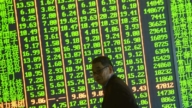【新唐人2014年02月27日訊】中國經濟的震盪此起彼伏,危機重重。截至去年底,中國非金融類公司的債務總額創12萬億美元新高,為國民生產總值GDP的120%。那麼導致中國企業債務規模增高的原因是甚麼?這反映出中國怎樣的經濟現狀?今年又是企業債券償債的高峰年,那麼會發生大規模的違約嗎?我們來聽聽專家的分析。
根據國際信評機構「標準普爾(Standard & Poor’s)」的調查,中國企業債務已飆上歷史新高。截至去年底,中國非金融企業的未清償銀行借款及債券負債總額達12萬億美元,相當於中國國內生產毛額GDP的120%多。
據英國《路透社》調查,中國945家中大型非金融上市企業總負債,從2008年12月到去年9月,近5年期間,膨漲超過了260%,金額從1萬8200億元人民幣暴增到4萬7400億元人民幣。
美國南卡羅來納大學艾肯商學院教授謝田:「現在的報告從08年到13年增長了260%,那實際上對於外界來說,可能是有點小小的吃驚,因為我們不知道它是怎麼樣、通過甚麼途徑突然增長這麼快呢,還是一直很多,但外界並不清楚。」
美國「南卡羅來納大學艾肯商學院」教授謝田認為,中國企業債規模增長,實際上跟中國其他債務,如公共債務、政府債務、私人債務、民間債務一樣,一直都是不透明的。他表示,如果這些數字是可信的,說明中國現在從政府到民間、到企業債務,問題已經相當嚴峻了。
北京《國情內參》期刊首席研究員鞏勝利表示,中共政府,從中央到地方、再到最基層各級政府管理的7級構架,導致了中國企業運行的質量低,是中國企業債務規模增高的原因之一。
北京《國情內參》期刊首席研究員鞏勝利:「這7級構架還是雙重構架,有政府的機構以外,還有一個黨的運行,那麼它就成了經濟運行、企業運行、營運運行,包括資源性運行,包括資本運行、銀行運行、貨幣運行,都付出了非常高昂的成本。」
《路透社》報導的數據顯示,中國的電力和建材企業,是所有公司中債務與資金槓桿最高的,截至去年9月底,這兩個行業的債務都是股權的兩倍。
日前發佈的《2013年中國500強企業報告》顯示,以500強為代表的中國企業高槓桿率,顯然已處於一種不可持續的狀態。報告指出,如此高的債務槓桿模式非常危險。
謝田表示,企業的債務過高、槓桿率增高,如果是經濟還在快速增長就不是問題,對於企業的擴張、企業的發展是有益的。
謝田:「但是中國企業不是真正按風險狀況來運作的、也不是獨立運作的,它是政府行為,在進行投資、擴資或融資的時候,往往不按照市場規律和市場的需求來做,而完全按照長官的意志或地方政府官員、或共產黨官員公布假的、有水分的GDP來做。」
「標普」董事總經理Christopher Lee表示,中國的企業債膨脹的主要推動力,是2008年金融危機後,政府推出的4萬億刺激政策。
鞏勝利:「中國經濟現在驅動的能力就是靠貨幣投放,不投入貨幣的話,GDP7%(增長)也不能夠完成。所以中國這個投資很麻煩,一個是貨幣投放量最大,面臨著通貨膨脹、貨幣貶值。所以貨幣投放量很大也是一大災難。」
今年初,中共發改委表示,今年是企業債券償債高峰,預計將有1000億元的城投債券將到期必須兌付。儘管分析師預期短期內中國不致爆發信貸危機,但分析師表示,一些財務槓桿最重的中國產業企業,都正在紛紛拋售資產及企業整併,以避免自身債務違約。
不過,「標普」駐香港大中華企業評級董事總經理李國宜預警,中國會有更多的企業債務違約出現,原因是當地流動性緊縮,借貸成本已開始攀升。
而隨著美聯儲縮減QE政策,熱錢開始逐步離開中國,這也增加了企業借新債還舊債的難度,加大了中國的違約風險。
採訪編輯/易如 後製/周天
China’s Company Debt Soars US$12 Trillion
Has Hidden Economy Risks
China’s financial debt has continuously hit record levels.
Reuters reported that at the end of last year, Chinese
non-financial companies,
held a total debt of about US$12 trillion.
(72 Trillion yuan)
It equals to over 120% of GDP ( Gross Domestic Product).
What’s the cause of the high debt? And what does it reflect in
the current economic status?
This year is a peak year for companies to repay their debt,
Will a large default possibly occur?
Let’s take a look.
Standard & Poor’s (S&P), estimates that growth in Chinese
company’s debt, has been unprecedented.
At the end of last year, Chinese non-financial companies held
a total outstanding of bank borrowing and bond debt,
of about US$12 trillion.
It equals to over 120 percent of GDP.
non-financial firms,
showed total debts have soared by more than 260 percent
between December 2008 and September 2013.
The amounts increased from 1.82 trillion yuan (US$294.4 billion)
to 4.74 trillion yuan (US$777.3 billion).
Xie Tian, Professor at Aiken Business School, University
of South Carolina:
“Thomson Reuters’s report says, total debt has increased
by 260 percent.
It is a big shock for outsiders, as we don’t know how and
by which way it suddenly rose so rapidly?
Or has it always been this much? Yet we figure,
the outside world has no knowledge of it.”
Xie Tian believes that the scale of Chinese corporate debt
growth is the same as other debt –
be it public debt, governmental debt, private debt, etc.
They have always been opaque.
If the figure is reliable, it indicates that the governmental
and the company’s debt have reached very serious levels.
Gong Shengli, a leading researcher of financial intelligence in
Beijing, says that from the central to local regime,
and to seventh level of management, they operated the company
in a low quality environment,
it is one of the reasons to have caused the growth of
Chinese company’s debts.
Gong Shengli: “The seventh level of management
is a double structure: government and the Communist Party.
It’s caused high cost in the operations of economy, companies,
logistics and resources.
It also includes capital running, bank operation and
currency engagement. They are all paying a very high cost.”
“Thomas Reuters data shows, China’s power producers
and construction materials firms,
are among the most highly levered in the world’s
second-largest economy.”
“With each Sector reporting twice as much debt
as equity by the end of September.”
The recently released 2013 China Top 500 Enterprises Report,
shows 500 firms represent China’s enterprises with high leverage.
Obviously it is in an unsustainable state.
The report points out that such a high leverage
model is very dangerous.
Xie Tian says that the company’s debt is too high, and also
the leverage ratio has increased.
If the economy is growing fast, it is not a problem,
it will be of benefit to any company’s expansion and development.
Xie Tian: “However, China’s company is not really operated
and based on risk status, neither is it independent.
It is controlled by the government.
When it needs investment or the expanding of funds,
it doesn’t follow the marketing rule or market’s demands.
But to follow orders from leaders and local government,
or to follow the false GDP provided by the Communist officials.”
According to Reuters’ report, Christopher Lee, managing
director of S&P (Standard and Poor),
says that exacerbating China’s corporate troubles,
has been the questionable use of four trillion yuan
in stimulus, following the global financial crisis in 2008.
Gong Shengli: “China’s economy is now driven by the
money supply.
Without an injection of money, the growth of 7% GDP
cannot be achieved.
Thus China’s investment is indeed very troublesome:
The amounts of money being injected is the largest, which faces
the inflation and devaluation issues.
So a great amount of injection would also be a disaster.”
Early this year, National Development and Reform Commission,
said this year is a peak year to repay the debt.
It is estimated that 100 billion yuan of city bonds needs
to be paid back.
Although analysts say China won’t break out of credit crisis
in a short term.
Some state-run enterprises with heavy financial leverage are being
sold of its assets,
or they are merging with other companies to avoid
defaulting the debt on its own.
Christopher Lee says that there will more defaults appearing.
Due to tightened liquidity and of lending going forward.
Following the US Fed QE’s reduction,
the hot money has gradually moved out from China,
which has increased the difficulty for companies to lend
the money to repay the old debt,
thus the defaulting risks are even greater.
Interview & Edit/Yiru Post-Production/Zhoutian




























